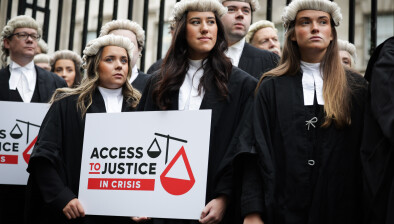NI: Court of Appeal: Man convicted of raping his stepdaughter loses application to appeal
A man who was convicted of raping his stepdaughter when she was a teenager has lost an application to appeal against his conviction.

About this case:
- Judgment:
- Court:Court of Appeal
- Judge:Lord Justice Stephens
Dismissing the appeal, Lord Justice Ben Stephens said that the grounds of appeal, both individually and cumulatively, did not render the verdicts unsafe or engender a significant sense of unease.
Background
In May 2019, BJ was convicted of seven counts of rape, five counts of indecent assault and three counts of common assault. The victim was his stepdaughter, KC. The counts relate to actions on dates between 1982 and 1991 when KC was under the age of 17.
BJ was found not guilty by unanimous jury verdicts in relation to 12 other counts of rape in respect of KC which were said to have occurred between 1991 and 2007, after her 17th birthday.
The night shift
The first ground of appeal advanced by BJ was that the jury “incorrectly decided the case in a way that was contrary to clear and unequivocal evidence which suggested that KC’s mother only started working night shifts from November 1994”. BJ sought to submit fresh evidence which had not been submitted at trial – namely a HMRC document setting out the employment and tax records of KC’s mother and “”an affidavit sworn by KC’s mother explaining the attempts made prior to the trial by her to obtain her employment records” for the relevant period. It was suggested that this evidence would have “fundamentally undermined the prosecution case on the basis that KC’s mother would have been in the family home on the night that all the offences apart from one were alleged to have occurred”.
Noting that the admission of fresh evidence in criminal appeals is a matter of discretion (as per section 25 of the Criminal Appeal (Northern Ireland) Act 1980), Lord Justice Stephens said evidence would be admitted if it was considered “necessary or expedient in the interest of justice”.
Finding that it was not necessary or expedient in the interest of justice to admit either the HMRC letter or KC’s mother’s affidavit, Lord Justice Stephens said there was no reasonable explanation for the failure to adduce this evidence at trial.
Dismissing this ground of appeal, Lord Justice Stephens explained that KC was cross-examined at the trial about the date upon which her mother started working night shifts and whether she had worked night shifts for any other employer. He said it was “open to the jury to accept that a young girl of 8 or 12 years of age was confused as to the identity of her mother’s employer but was correct in her assertion that her mother was not in the home when she was physically and sexually abused”.
Makanjuola warning
Another ground of appeal was that the trial judge erred by failing to give a Makanjuola warning to the jury regarding the inconsistencies and what were alleged to have been lies in KC’s evidence.
Lord Justice Stephens said it was “a matter for the trial judge’s discretion whether or not to give a warning to the jury in respect of the unsupported evidence of an alleged accomplice or complainant in a sexual case” (as per R v Makanjuola [1995] 1 WLR 1348) and that “the nature of the warning and whether or not to give it would depend upon the circumstances of the case, the issues raised, and the content and quality of the witness’s evidence”.
While asserting that he would have given a warning urging caution, particularly given the historic nature of the case, Lord Justice Stephens said he could not describe the trial judge’s decision not to do so as “unreasonable” given that he “had been immersed in the trial and was in a far better position to form a discretional judgement than the members of the Court of Appeal working from transcripts of the evidence”.
Even if a warning ought to have been given, Lord Justice Stephens said the this did not render the verdicts unsafe “as the alleged inconsistencies and/or lies were extensively explored in cross-examination, put before the jury in the defence closing speech, and referred to by the judge in his charge to the jury”.
Furthermore, “it was open to the jury to form the view that the inconsistencies did not undermine the prosecution case”.
Sexual behaviour
A further ground of appeal was that the trial judge “erred by refusing a defence application to cross examine KC about an account she gave to her half-sister in 1998/1999 as to the circumstances in which KC first had sexual intercourse and lost her virginity at the age of 14 or 15 which, if correct, meant that KC’s evidence of losing her virginity through rape by the Applicant at the age of 12 could not be correct”.
Lord Justice Stephens said that leave ought to have been granted, but in considering whether this rendered the verdicts unsafe, he commented that there had been no explanation as to why this evidence was only mentioned on the first day of trial. Lord Justice Stephens also expressed concern about the “persistent lies” told by BJ that he never had sexual intercourse with KC. Furthermore, since BJ accepted that he was sexually attracted to KC when she was 19 – it was understandable that, given her evidence, the jury took the view that he was also sexually attracted to her prior to that.
Dismissing this ground of appeal, Lord Justice Stephens concluded that this evidence did not lead to a significant sense of unease about the correctness of the verdicts.
Jury pressure
The final ground of appeal was that the trial judge “erred in the management of the trial by creating a situation that led to pressure being exerted on the jury to make a decision by allowing the deliberations to stretch to a period of four days”.
Considering the fact that the trial involved 27 counts which had to be considered individually, Lord Justice Stephens said the jury were given adequate time, with adequate and appropriate directions. He also dismissed the suggestion that the jury was put under pressure.
Dismissing this ground of appeal, Lord Justice Stephens said the length of the deliberations was indicative of the care taken by the jury in coming to their verdicts.
Considering the grounds of appeal both individually and cumulatively, Lord Justice Stephens concluded that the verdicts were not unsafe and did not engender a significant sense of unease.









